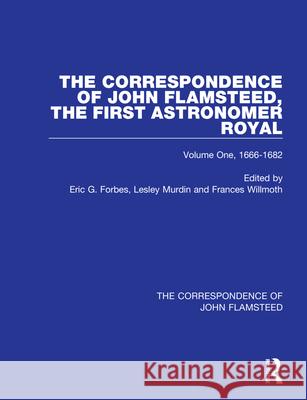The Correspondence of John Flamsteed, the First Astronomer Royal - 3 Volume Set » książka
The Correspondence of John Flamsteed, the First Astronomer Royal - 3 Volume Set
ISBN-13: 9780750308199 / Angielski / Twarda / 2001 / 704 str.
The Correspondence of John Flamsteed: The First Astronomer Royal, Three Volume Set explores the work of Flamsteed through his letters.
The first volume serves as an essential guide to the exciting developments in scientific thinking that occurred during the seventeenth century by supplementing the published correspondence of Isaac Newton and Henry Oldenburg. It will be an invaluable research tool, not only for historians of astronomy, but also for researchers examining how scientific thought developed.
The second volume contains the letters Flamsteed wrote and received from June 1682 to the spring of 1703. A leading figure in the final phases of the seventeenth-century scientific revolution, his extensive correspondence with 129 British and foreign scholars touches on many of the scientific discussions of the day. Some of these exchanges involved established correspondents, chiefly Newton and Wallis, but members of a younger generation, such as Stephen Gray, William Derham, and Abraham Sharp, appear with increasing frequency, especially after 1700.
The last volume of the set includes letters from 451 to 1250.
The Correspondence of John Flamsteed: The First Astronomer Royal, Three Volume Set explores the work of Flamsteed through his letters.
The first volume serves as an essential guide to the exciting developments in scientific thinking that occurred during the seventeenth century by supplementing the published correspondence of Isaac Newton and Henry Oldenburg. It will be an invaluable research tool, not only for historians of astronomy, but also for researchers examining how scientific thought developed.
The second volume contains the letters Flamsteed wrote and received from June 1682 to the spring of 1703. A leading figure in the final phases of the seventeenth-century scientific revolution, his extensive correspondence with 129 British and foreign scholars touches on many of the scientific discussions of the day. Some of these exchanges involved established correspondents, chiefly Newton and Wallis, but members of a younger generation, such as Stephen Gray, William Derham, and Abraham Sharp, appear with increasing frequency, especially after 1700.
The last volume of the set includes letters from 451 to 1250.











